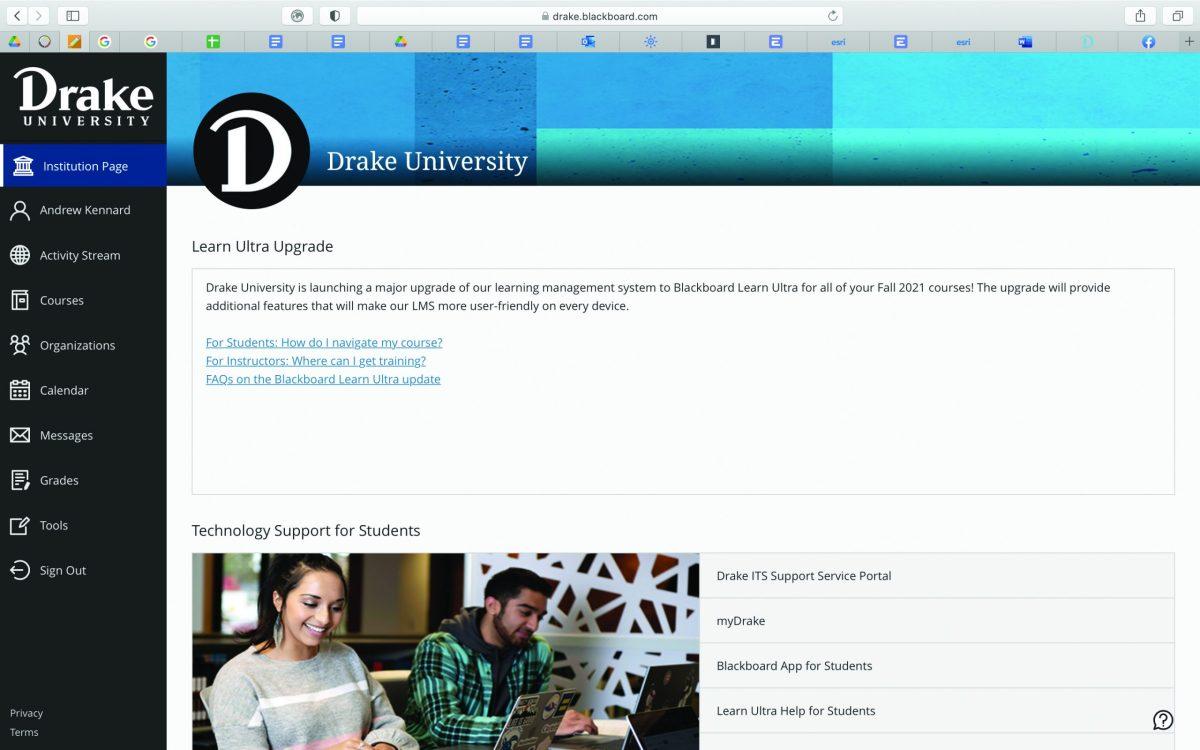Two years after Drake began transitioning to a new version of Blackboard, complications created by the pandemic are still placing additional burdens on faculty and others working behind the scenes.
Drake completed the switch to the new Blackboard Learn Ultra in August of 2021, but some professors are still working to learn the new system while also trying to support their students and transition back to in-person classes.
“There have been a number of challenges that made this change difficult for all of us,” said Jeff Inman, an associate professor of journalism and mass communications at Drake.
The first challenge facing Blackboard Ultra’s implementation was unlucky timing. In January of 2020, a team of 20 members from across Drake finished planning the complete timeline for the transition to Blackboard Ultra. Two months later, the pandemic reached Drake and completely changed how students and faculty used online learning tools.
Karly Good, a learning management specialist for Drake Information Technology Services (ITS) and the administrator for Blackboard Learn at Drake, estimates that students and faculty went from using online tools for about 50% of their learning to nearly 100% due to the pandemic.
“We chose the timeline for the rollout of Learn Ultra very carefully as we, the [Learning Management System] Review team of 20, watched the development of the features [that] faculty here at Drake used most,” Good said. “Once we chose the timeline, the pandemic hit and slowed the development.”
Drake ITS, which has been overseeing the Blackboard transition, determined that the pre-COVID timeline for Blackboard Ultra’s implementation was still viable despite the education challenges brought on by COVID-19. Good said that starting in October of 2020, ITS began the process of providing faculty with tools to assist in learning the new Blackboard, and by spring, ITS had introduced virtual workshops.
The next challenge for the switch to Blackboard Ultra was the pressures put on faculty by the pandemic.
For students, the switch to online learning meant their classes could not meet in person. For professors, the switch to online learning meant they had to rebuild large portions of courses to make the content suitable for a new teaching format.
Outside of the teaching challenges, professors also juggled the psychological effects of the pandemic. Kelly Bruhn, an associate dean and public relations professor in Drake’s School of Journalism and Mass Communication, called the work that faculty did “amazing” and highlighted the effort they put into working with students during the pandemic.
“Faculty did have an increased load in both handling the students academically and making sure they were professionally prepared, but also just helping them mentally and physically navigate what it’s like in a global pandemic when we were trying to manage that in our own families and our own personal lives as well,” Bruhn said.
With the added pandemic workload, Inman said finding the time to learn to use Blackboard Ultra was difficult, but despite this, ITS and faculty have worked together to provide students with increasingly accessible online tools and have found positives in an otherwise difficult situation.
“We have something like ten hours’ worth of help videos available to watch,” said Christopher Porter, co-chair of Drake’s math and computer science department. “I didn’t have a very hard time with it because I had those models to follow.”
Good noted how online learning has drawn new attention towards providing students with resources that work in both the classroom and non-traditional environments.
“I actually think the switch to virtual was a positive move for the transition as more faculty gained a great understanding of teaching and learning online,” Good said. “Change is always hard, but I think we all have emerged with a better understanding of more inclusive environments, different learning needs, the understanding of why flexible learning has such a positive impact on those who cannot be traditional learners, and what the effects of changing technology have on each of these aspects.”
For students like Drake sophomore Nash Lindsey, the transition to Blackboard Ultra has been a helpful experience.
“This new Blackboard is much more aesthetically pleasing than the previous version, and it feels easier to find the stuff you need,” Lindsey said. “I haven’t had a whole ton of experience with this new version of blackboard, but it seems like it’s going to be better for us.”







